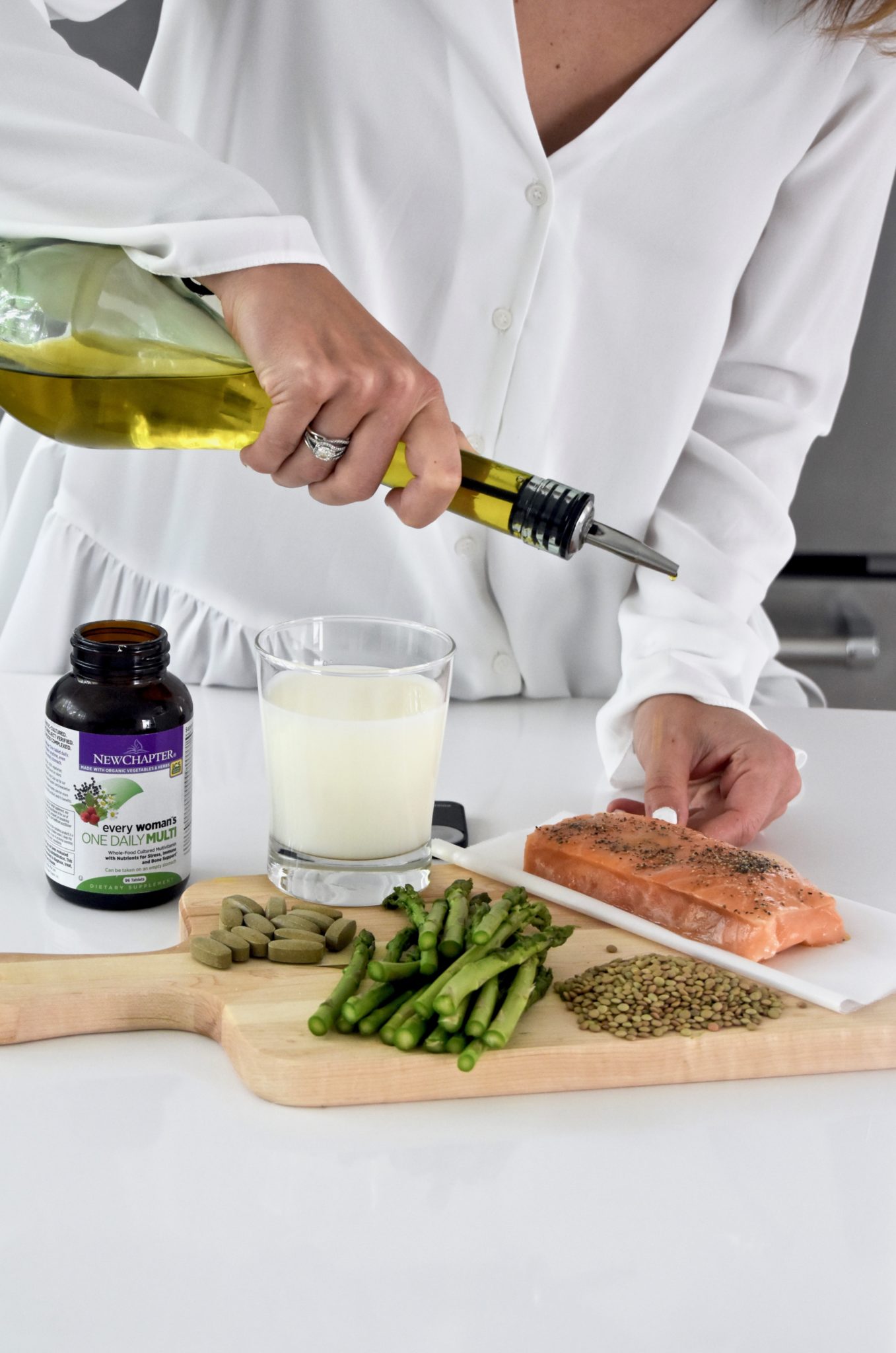
This post is sponsored by New Chapter; all opinions contained within are my own. As always, thank you for allowing me to partner with companies to create wholesome recipes and speak about the topics I’m passionate about.
I’ve blogged recently about important nutrients for women during and after pregnancy so I think it’s only fair to also discuss those of importance for women in general!
While nutrient intake is especially important while pregnant, there are a handful of nutrients that are important for women to take regardless of pregnancy or nursing status.
As always, I recommend working to meet your daily nutrient needs through food. That said, I know many people have a hard time getting all of their nutrients through food – life gets hectic, I get it! In a perfect world, every day would be filled with 3 balanced meals, rich in variety with 2 snacks. Unfortunately, working on my business and chasing a busy 6-month-old around the house all day means that’s not always realistic – which is why I personally like to take a multivitamin to ensure that I’m filling in any nutrient gaps.
As a busy new mom, I turn to an whole food supplement to ensure I am getting the nutrients I need. New Chapter’s Every Woman’s One Daily Multivitamin is a multivitamin that’s been fermented with probiotics so it can be taken anytime – even on an empty stomach. It contains vitamin D3 to support bone health and whole-food sourced vitamin K to support healthy calcium metabolism.* The multivitamin also includes cultured zinc and vitamins C & A for immune system support.* I love a multivitamin that’s only required once a day! I set the bottle out next to my coffee (something else I know I’ll have every day!) so that when I press brew on my machine, I see it and remember to take it first thing!
Below I’ve included a detailed round-up of the nutrients women should always try to get in their diets or through a supplement likeNew Chapter’s Every Woman’s One Daily Multivitamin.
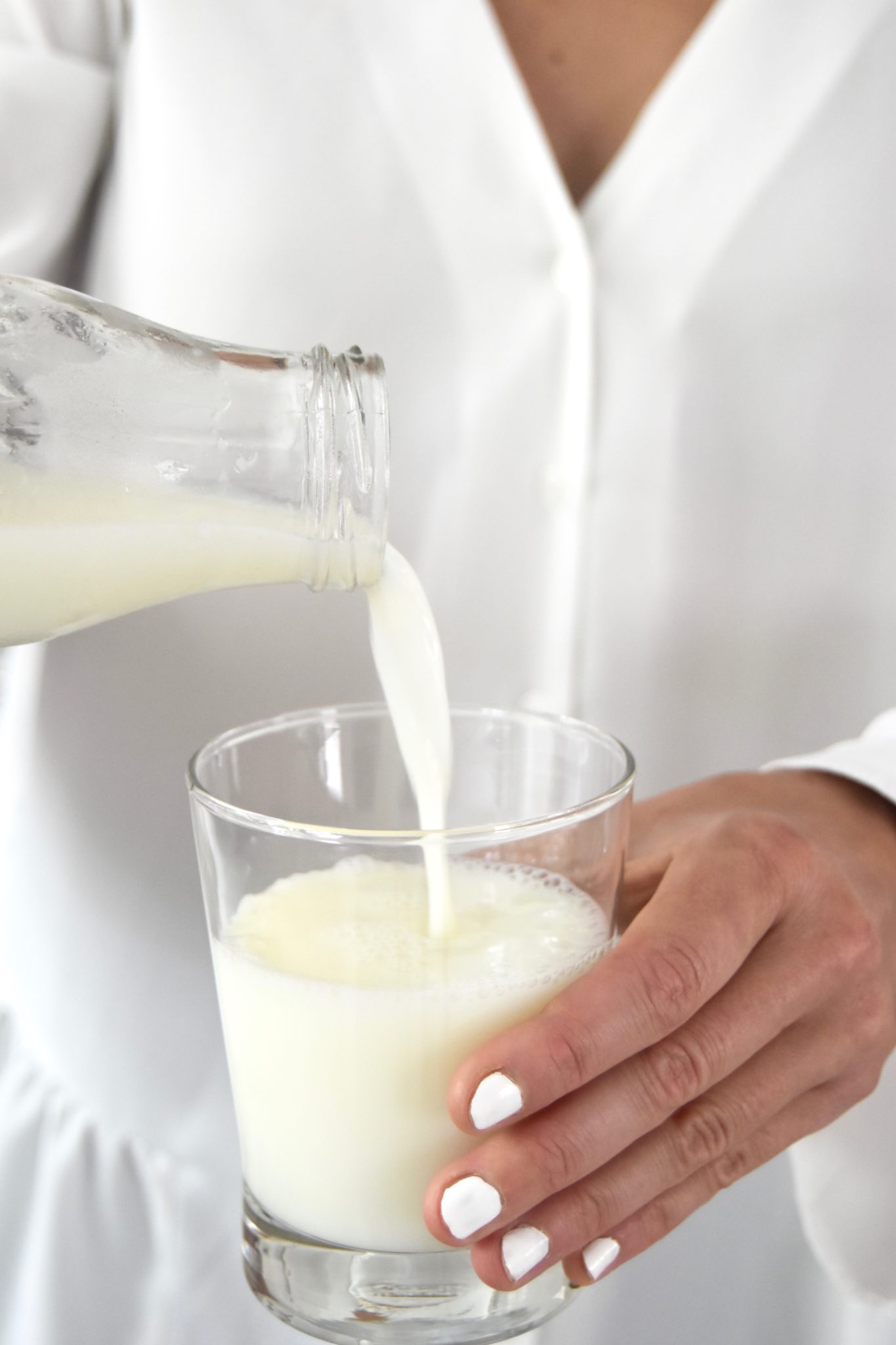
Calcium
Calcium has many functions within the body but chief among them for women is its role in bone growth and strength. Millions of women in the United States are affected by bone loss making calcium a nutrient of critical importance for women.
The recommended daily allowance of calcium for non-pregnant, non-lactating adult women who have not gone through menopause is 1,000 milligrams per day. After menopause, that increases to 1,200 milligrams per day to help offset natural bone loss that occurs with age. Calcium is abundant in many foods including dairy products, almonds, kale, broccoli and sardines with bones.
Try this: Yogurt with berries and a sprinkle of slivered almonds
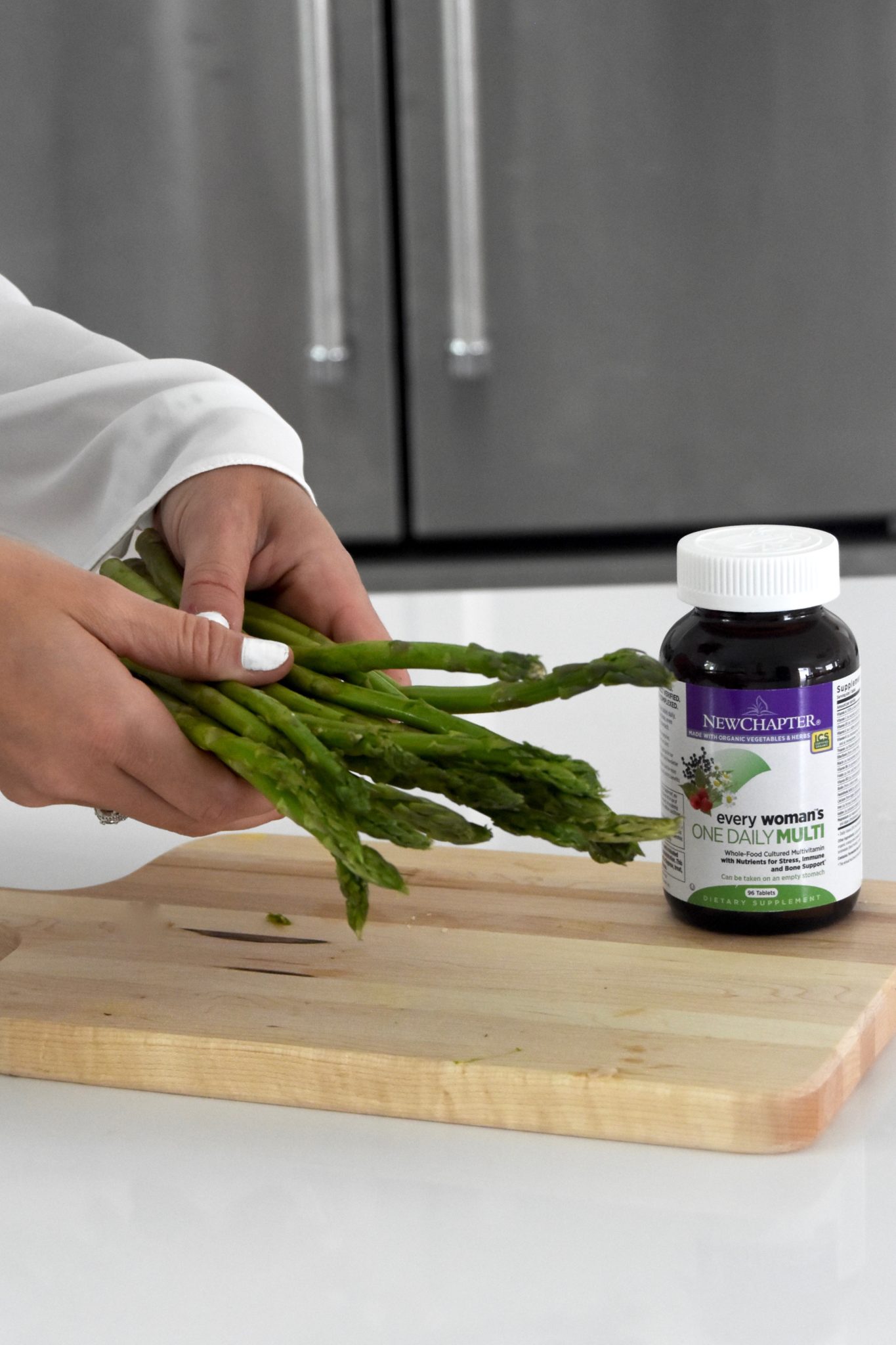
Folate
Folate (in its whole food form, or ‘folic acid’ in its synthetic form found in supplements and fortified foods) is a B vitamin of particular importance for women of childbearing age. Whether you’re planning to get pregnant or not, folate is an important nutrient in a woman’s diet. For women who may become pregnant, folate is critical in preventing the risk of babies developing neural tube defects (a condition than can have detrimental effects on the brain, spine or spinal cord). Moreover, folate is important for cell division as well as DNA replication and repair.
It is recommended non-pregnant and non-lactating adult women get at least 400 micrograms/day. Folate is naturally present in many foods such as asparagus, brussels sprouts, peanuts and oranges. Many grains including bread, cereals and pasta are fortified with folic acid as well.
In addition to folate-rich foods, New Chapter’s Every Woman’s One Daily Multivitamin provides 100% of a woman’s recommended daily value (400 micrograms) of folic acid to ensure they are receiving exactly what they need to support not only their own health but the health of any future children as well.
Try this: Baked tofu over rice with roasted asparagus and crushed peanuts
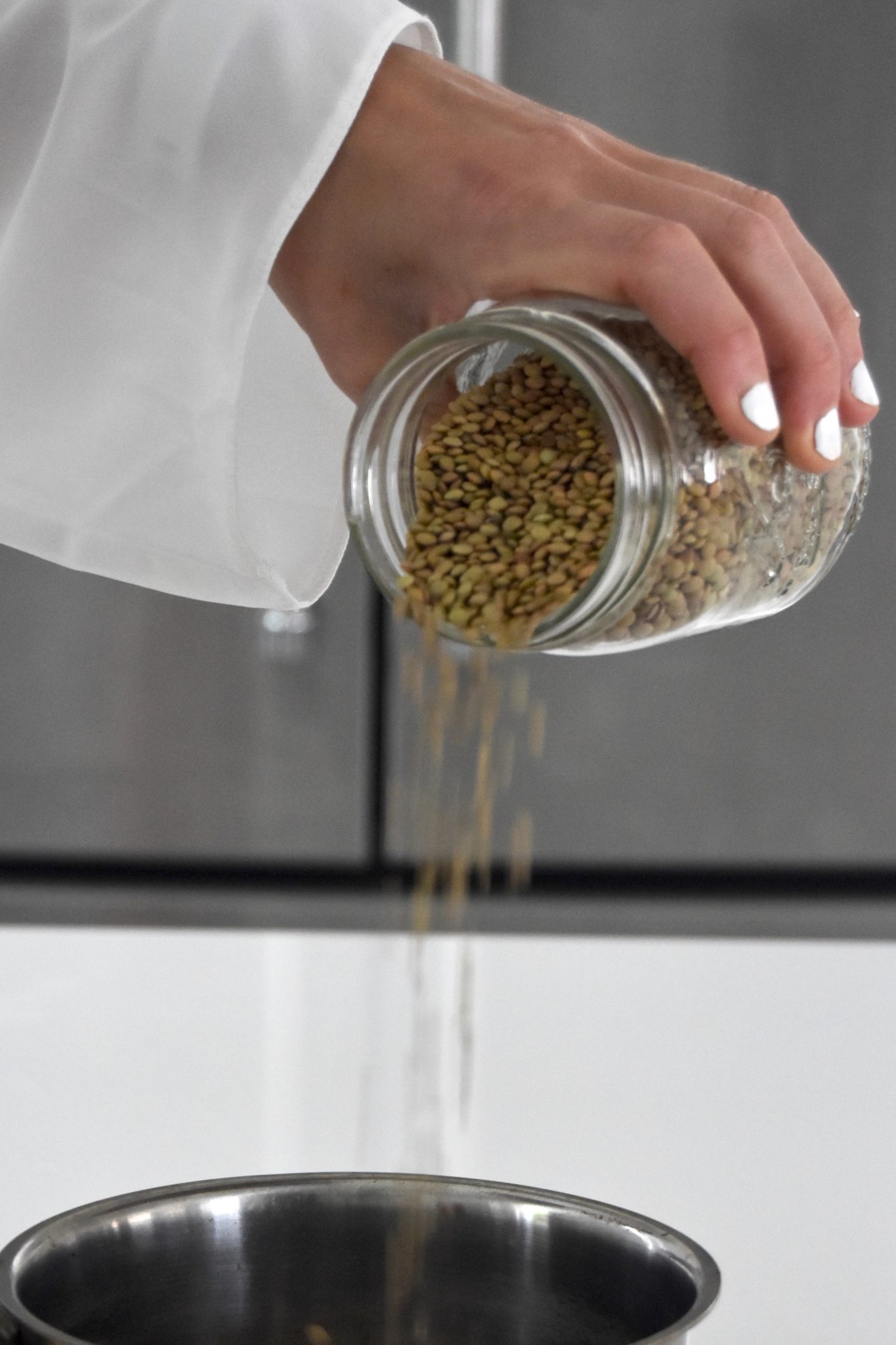
Iron
Iron is important for growth and development. About 2/3 of the body’s iron is found within hemoglobin, a protein in red blood cells that is responsible for carrying oxygen from the lungs to the rest of the body. Iron is also critical for myoglobin, a protein that provides oxygen to muscles. When our cells are not well oxygenated, we may feel sluggish and less energetic.
It is recommended that non-pregnant or lactating adult women get 18 milligrams of iron per day. As I’ve discussed in the past, there are two types of iron: heme and non-heme. Heme iron (from meat-based sources) is readily absorbed by our bodies and is present in foods such as lean meat, seafood and poultry. Non-heme iron (from plant-based sources) is less readily absorbed, usually requiring higher amounts and is found in foods such as lentils, spinach, kidney beans and nuts.
Try this: Warm lentil salad with sautéed shrimp and spinach
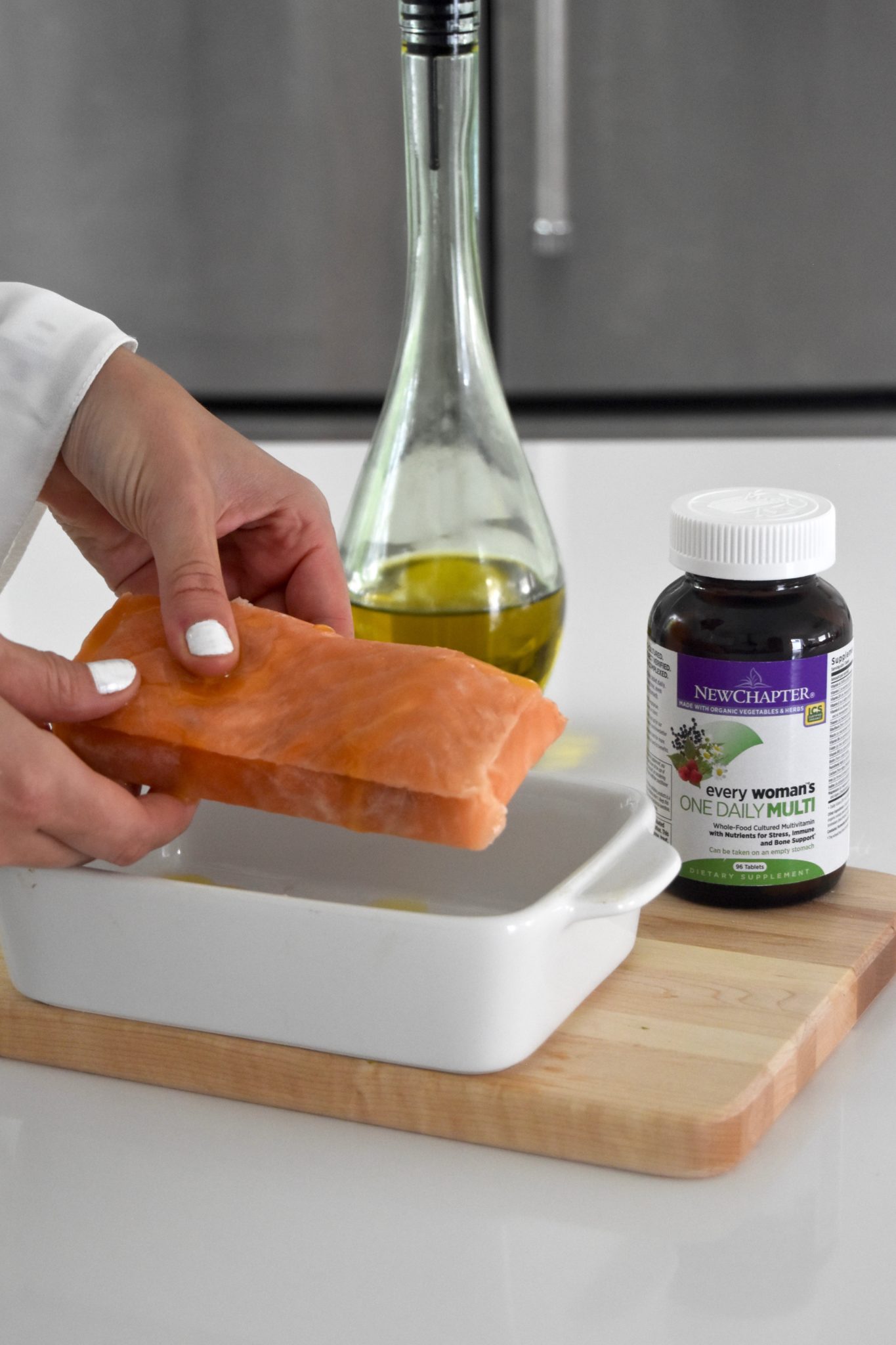
Vitamin D
Vitamin D aids the body in absorbing calcium, making it critically important for bone health. The body can make vitamin D with direct sun exposure to the skin (note that sunshine through a window, on cloudy days, in the shade, with sunscreen or clothing layers will significantly impact the amount of vitamin D produced). With warmer weather upon us, getting our daily dose of vitamin D won’t be as difficult as it was in the winter months, but for those of us that live in areas that have four seasons, we can’t rely on that year-round.
The recommended daily allowance for adults is 600 international units per day. That said, there is evidence to suggest that higher doses may be optimal. The current tolerable upper limit for Vitamin D is 4,000 international units per day. Very few foods are naturally rich in vitamin D–fatty fish such as salmon, tuna and sardines are good sources, but most people get vitamin D from supplements or fortified foods (particularly during the winter months).
New Chapter’s Every Woman’s One Daily Multivitamin supports bone health with fermented Vitamin D3* New Chapter’s fermentation process is a unique 2-step method that brings greater vitality to the vitamins, minerals, and herbs making them easily digestible.* This means they are gentle enough to take anytime—even on an empty stomach (which is super helpful if you’re like me and need to take your multivitamin first thing so as not to forget!). Every Woman’s One Daily Multivitamin also includes a nutrient-packed fermentate that delivers many beneficial factors including immune-boosting beta glucans*.
Try this: Spinach salad topped with grilled salmon
As always, a whole food diet that focuses on variety, including whole grains, fresh fruits and vegetables, lean protein and heart-healthy fats is the best way to ensure you’ll meet your daily dietary needs. If you’re concerned you might be falling short on any of the above nutrients and you’re interested in adding a multivitamin to your routine, ask your doctor about including New Chapter’s Every Woman’s One Daily Multivitamin. If you decide it’s right for you, you can use code CAITEWOD for $4 off any 48 ct. or larger of Every Woman’s One Daily Multivitamin, Every Woman’s One Daily 40+ or Every Woman’s One Daily 55+ now through 7/11/18.
Disclaimers: As with any dietary or herbal supplement, you should advise your healthcare practitioner of the use of this product. If you are nursing, pregnant, or considering pregnancy, you should consult your healthcare practitioner prior to using this product. Always talk to your doctor prior to implementing anything new to your routine.
*These statements have not been evaluated by the Food and Drug Administration. This product is not intended to diagnose, treat, cure, or prevent disease.
1
Leave a Reply